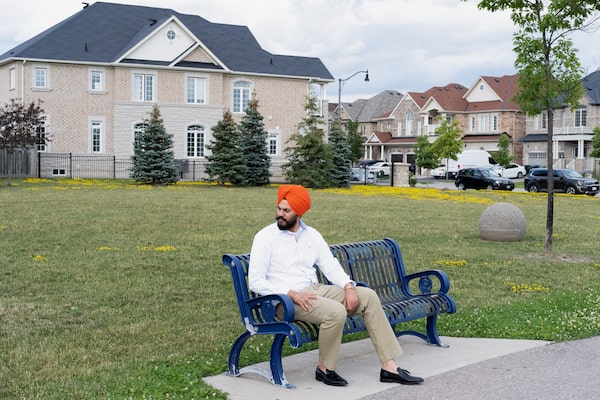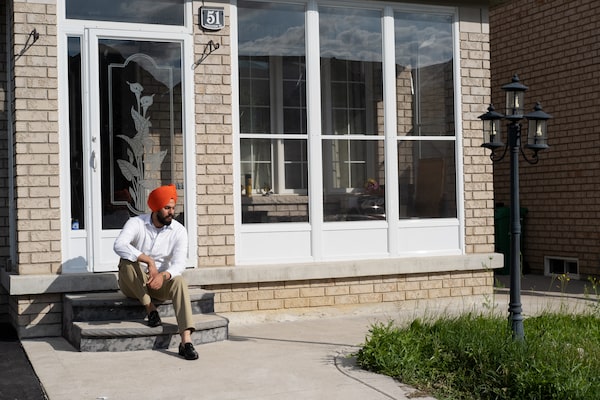
Surmeet Singh lives in Brampton, Ont. As a Sikh man, he said, he felt he was 'expected to stay strong,' amid the pandemic even as he struggled with increasing stress.Narisa Ladak/The Globe and Mail
One day last summer, Surmeet Singh caught a view of himself in the mirror and hardly recognized himself. “I looked like I had aged about 10 years,” the 27-year-old says. “I wasn’t the person I used to be.”
The stress of the previous months had left its mark. The worrying about paying off student loans and covering rent for his Brampton, Ont., apartment. The exhaustion of working nearly every night as a supervisor at a gas station, while ambitions for his project-management degree stalled. The disappointment of having to cancel a trip to India to see his parents for the first time in three years.
The sameness of the days in lockdown had chipped away at his mental health. “I was an introvert to begin with,” he says. “I just withdrew into my shell.” It wasn’t easy to admit he was struggling. As a Sikh man, he explains, he felt he was “expected to stay strong.”
And yet, as the lockdown continued and the virus surged, community-based mental-health advocates say they began to see more men, like Mr. Singh, come forward to speak candidly about the issues they were confronting – a trend that has also highlighted the need for more culturally appropriate services for the South Asian communities living in the hottest of Canada’s COVID-19 hot spots.
The pandemic has led to an increase in self-reported anxiety and depression across the country. But the virus has been particularly devastating for residents of the GTA’s L6P postal code in Brampton. Cases have been disproportionately high. The lockdown also confined many families to crowded housing, while breadwinners lost jobs or those employed in manufacturing, retail or health care positions were unable to work safely from home as COVID-19 surged through the community.
The burdens of the pandemic have led to more men seeking mental-health support, says Harinder Sahota, the supervisor of the addiction program at Punjabi Community Health Services in Brampton. Before, Mr. Sahota says, men rarely called the organization’s support line – but in the last year, calls from or about men now account for 35 per cent of PCHS’s caseload.
Maher Hussain, clinical director at South Asian Canadians Health and Social Services, also based in Brampton, says mental-health cases involving men have doubled over the last year, including clients coming to the centre for court-mandated treatment.
Mr. Singh says he saw the pressure and stress increase problems among his own circle of male relatives and friends. “I saw men around me completely change – they were getting aggressive; people who hadn’t touched alcohol all their lives started drinking.”

Mr. Singh came forward to speak candidly about the issues he was confronting.Narisa Ladak/The Globe and Mail
Since last November, SOCH Mental Health, an organization started by two Brampton nurses in 2015, has been hosting weekly online sessions to discuss men’s issues in Hindi, English and Punjabi. The numbers have increased to as many as 35 participants, including men in their 30s through to their 60s. Sessions were intended to last 90 minutes, says Jas Khehra, one of the group’s five male facilitators, but have sometimes stretched for three or four hours, covering topics such as suicide, depression and family expectations.
“There is a lot of pressure on men to meet milestones,” explains Jeevan Dhaliwal, another SOCH men’s forum facilitator. “You have to get married and have kids by a certain age. You also need to be at a certain place in your career. This pandemic has put a wrench in the works.”
Pandemic lockdowns have also exacerbated some of the tensions within families living in multigenerational homes, Mr. Dhaliwal says, leading to tough conversations in some sessions about parental roles – and rules.
It helps that Mr. Dhaliwal and Mr. Khehra are open about their own mental-health issues.
Mr. Dhaliwal has struggled with anxiety and obsessive compulsive disorder – he lost a close friend to suicide, and at one point became suicidal himself, but says he was lucky to have someone who talked him out of taking his own life.
Mr. Khehra, who is diagnosed with OCD and depression, concealed three suicide attempts from his family for more than a decade. “It all stemmed from being bullied in high school – I was trying to fit in and when I tried being myself, I got ridiculed,” he says. In university, his new independence and a toxic relationship “got between my family and me,” he recalls.
He buried his feelings, until the happiness he saw at a friend’s wedding inspired him to go to therapy. When he finally told his sisters, he says, they surrounded him with love and support. “I’ve realized it’s a process,” he says. “I tell the attendees at the workshop that it doesn’t matter how you start in life – it matters how you finish.”
While most of the participants of the SOCH sessions were men, women occasionally attended as well – including daughters who appeared with their fathers to speak on their behalf and encourage their participation. “It was so beautiful to see,” Mr. Khehra says. “With older men, you can tell that the taboo has been passed down from generation to generation. Young women are trying to break those barriers by being there with their friends, fathers and colleagues.”
For Manpreet Singh, 38, a software programmer, the pandemic has been marked by loneliness. His wife travelled to India with their two young children in February, 2020, to care for her mother – a six-month trip that then stretched out longer than a year. Even before the border closed to India, Mr. Singh felt it was not safe for them to risk being exposed to the virus during the flights it would take to get home. But that left him alone back home in Brampton, isolated and hardly able to sleep at night.
“Mentally, it has been really tough,” he says. “I have worried about whether I will be able to see them again.” Getting help, he says, is complicated – and with his gurdwara closed during lockdowns, he could not even find solace in his faith community or distract himself through volunteering. Even if he knew the right number to call, he says, he is reluctant to speak candidly about his issues to a mental-health worker he doesn’t know.
Making that first call, when the risk feels high, is just one barrier to getting help. Some of those barriers are problems right across the country – long wait lists for publicly funded therapy, as well as the high cost of private therapists. But for many South Asian patients, SOCH facilitator Mr. Dhaliwal says, “if these programs do not have culturally sensitive practices or counsellors who speak the language, then it feels like a waste of time.”
Creating awareness, he says, only works if people find programs that feel inclusive – a quality that requires a community approach. That’s how they see SOCH’s men’s forum, which will increase to twice-monthly sessions and hybrid online/in-person meetings this fall after a brief summer hiatus. Men who once listened with their microphones on mute and their cameras off are now active participants, inviting their own friends to join. “It is a circle of care that keeps growing organically,” Mr. Dhaliwal says.
For Surmeet Singh, the support he received came through in his writing – SOCH also created a meeting place for South Asian poets and writers. Mr. Singh credits this community space for helping him process his feelings of loss during the pandemic.
“It took me some time, but I worked on myself every day and tried to accept things that I cannot change, like this pandemic,” he says. “It’s beyond my control.”
He decided that he could control what he did with his time – which included becoming more public about his poetry and finishing a script for a play he hopes will be staged at a local theatre this September. He is also aiming to eventually get back to India to see his parents.
“Being away from my family in Punjab at this time has been a very anxiety-ridden experience,” he says. “But living in Brampton is the closest I will get to home for now, and for that I’m grateful.”

The support Mr. Singh received came through in his writing.Narisa Ladak/The Globe and Mail
Surmeet Singh began writing this poem in 2018, but its meaning evolved during the pandemic as he found community through a writing group facilitated by SOCH Mental Health and reflected on the themes of loneliness, love, support and comfort. The following is an excerpt from his poem Rooh (or The Soul), translated into English from the original Punjabi.
Like the air, the wind, we need to move
Constantly
For stopping is akin to death
We may need comforting from time to time
But comfort from people who devalue us
Hurts us more
Then God sends us people
Who like honey and herbs
Soothe the pain within us
Empower us to soothe those weaker than us
Give them a voice, let them be their own masters again
So we can all rise and heal,
Together,
With our hearts full
Our Morning Update and Evening Update newsletters are written by Globe editors, giving you a concise summary of the day’s most important headlines. Sign up today.
